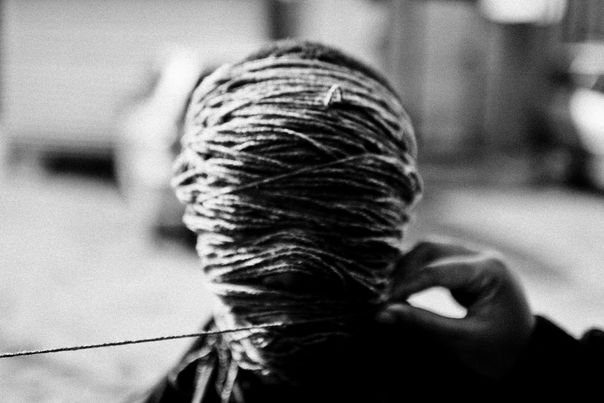Alibis
By Victor Guimarães

© Lemohang Jeremiah Mosese
Lemohang Jeremiah Mosese’s first feature-length essay film MOTHER, I AM SUFFOCATING. THIS IS MY LAST FILM ABOUT YOU (Lesotho/Qatar), part of this year’s Berlinale Forum, creates a space of intimacy for the viewer. The narrator’s voice, soft and rough, fuelled by a confessional sound design, constructs a suffering protagonist struggling to escape from painful attachments. While we see black and white, slow-motion highly stylized depictions of poverty and sorrow in Lesotho – not so different from the esthetics of Sebastião Salgado’s photography – the muttering speech reinforces the desperation of someone trying to get away and begin a new life somewhere else.
The monologue is addressed to a mother figure, but gradually we understand that it is a metaphor for Lesotho or Africa in general. Allegorical images such as a woman carrying a cross or an angel walking down the streets of the country share space with animalistic depictions of the inhabitants, such as a man emulating sex movements in a crowded street or a bunch of people slaughtering a sheep and fighting for its pieces. The protagonist constantly tries to distance themselves from this infernal imagery, and we soon learn that the narrator now lives in Berlin, where fortunately, for them, there are only a few occasional traces of the motherland.
In the entire film, there is not a single image that problematises the depiction of Africa as a land dominated by human beasts and fated to ruin – exactly as in all those white fantasies that constitute the crux of the colonial project, from the so-called African corpus of the Lumières to Hollywood fairy tales of racial reconciliation. Although it was directed by an African filmmaker, it is difficult to imagine a more hardcore neocolonialist plot: a European multicultural city as a paradisiac place of salvation for a desperate person that has succeeded in escaping from African hell. At the same time, it is virtually impossible not to identify with the authentic suffering of the protagonist. The authenticity of the subjective speech – convincingly constructed through a formal arsenal of self-representation, reinforced personal pronouns, intimate sound design – creates an almost mandatory identification with the poetic persona, which eventually becomes a rhetorical alibi against every possible criticism towards the film’s ideological perspective.
The problems in this work recall the words of the great Brazilian art critic Gilda de Mello e Souza: “The intention of the creator is precarious in the face of the uncontrollable autonomy of forms”. Building a contemporary neocolonialist fantasy of Berlin as a welcoming paradise for all the misfits of the world is probably not the intention of Lemohang Jeremiah Mosese. But we are dealing with forms, not with ideas. And especially when we think of where it is being shown for the first time, it is hard to think of a more suitable film to consensually please well-intentioned audiences, whom we can imagine leaving the theatre with tears of empathy in their eyes, while surreptitiously reassuring the myth of European supremacy.

